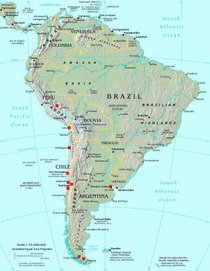Our adventure to Leipzig (an old town in Saxony, about three hours south-east of Berlin) began for me the night before, when I had to spend the night at Annie's house in order to be able to make it to the Hauptbahnhof (main train station) in the morning. I prob live about 20 minutes away (walking) from an S-Bahn (faster city trains) station, which were the only trains running during the strike.
In the morning, we decided to get up early, since the S-Bahns were likely to be packed with people trying to get around in the city without all the other public transportation. We got to the Hauptbahnhof around 11:30 and met up with Sean, John and Jessica, who were also coming on the adventure.
From Berlin to Leipzig, we took two trains and bought two five-person tickets. The Deutsche Bahn has tickets for each region of Germany that cost about 25 - 30 euros, on which up to five people can ride. On the way back, we used a similar five-person ticket that can be used anywhere in Germany, but only on Saturdays or Sundays. The round-trip train ride cost us 88 euros for everyone. The only down side of these tickets is that we could only use regional trains and not the express trains, so it takes a little bit longer.
Once we got into Leipzig, we found out 'hostel,' which Sean found on hostel world. It turned out to be an apartment that would be just for the five of us, with a complete kitchen for only $12.75 a night per person.

[Jessica sitting in one of the bedrooms of our apartment]
After we unpacked, we headed to the grocery store to buy some dinner and breakfasts for the weekend. We decided to make a pasta sauce with tomatoes, peppers, mushrooms, onions and fresh basil. A joint effort between Annie, Jessica and I yielded quite a delicious meal on a very cheap budget.

[Me, John and Sean eating our delicious meal]
The next day, we headed into the city center to see the older part of town. We started at the Nickolaikirche, which is known for having been a center of anti-DDR (East German) movement during the division of Germany. The history that we got on the church, from a pamphlet written by the priests of the church, was as interesting as the architecture inside. Instead of being a dark church with little light, it was a bright interior with light pink and green walls.

[the Nikolaikirche from the square outside]

[the inside, where the ceiling was a pretty pink and green, with columns that look like palm trees]
From there, we walked around the center some more, coming across the old stock market building as well as a statue of Goethe, the famous author/playwright.

[the old stock market building; now a hall that you can rent out]

["The Man" of German Lit; Goethe!]
On the other side of the old part of town is the Thomaskirche, the church where Bach was a cantor. The church offers concerts with his pieces every Saturday. Although we weren't able to hear a concert, there was a quintet playing while we were in the church. Bach's grave was also moved to the church in more recent years.

[Thomaskirche]

[A statue of Bach... the people in front were part of a wedding party...]
Sean and I, being in the theater class and having just read Faust, thought it necessary to go to Auerbach's Keller, where a scene from Faust takes place.

[Auerbach's Keller, where a scene of Faust is set]

[Mephistopheles leading Sean into sin..]
From the center, we headed to the Voelkerschlachtdenkmal, a little outside the center.

[View of the Denkmal]
The largest man-made war memorial in Europe, this Wilhelmine memorial is surprisingly unknown. The 91-meter-tall structure was erected as a memorial to the defeat of Napoleon at the Battle of the Nations, and is clearly a very nationalistic symbol. As such, it has been used and misused by leaders of Germany since it was built in 1913, one of which is Hitler. But no where my guide book was it mentioned, nor did my host mom or my German teacher know about it. For such a huge memorial, we found this very surprising. However, since it is so nationalistic and that is something that Germany has been trying to move away from, we could kind of understand why it is not so advertised or well-known. The advice from the hostel owner to go there was great though, because it was really amazing once we were there.

[Huge statue at the entrance]

[In the elevator on the way to the first platform... the other 500 stairs we had to walk up]

[The inside chamber of the memorial, with various representations of the battle. Sean also told me that it was mainly built by Freemasons, so there is a lot of allegory to their organization in the building of the memorial]

[The group at the top!]

[Me with a view of Leipzig. This memorial is a must-see during a visit to Leipzig]
We headed back into town, and relaxed, cooked dinner, and played some cards until we decided to look into the night life of Leipzig. Since it is a university town, we expected there to be some excitement. There was, but not too much when compared with Berlin. The next morning, we cleaned up the apartment and headed back to Berlin with enough time to do homework and sleep before the busy week started again.


